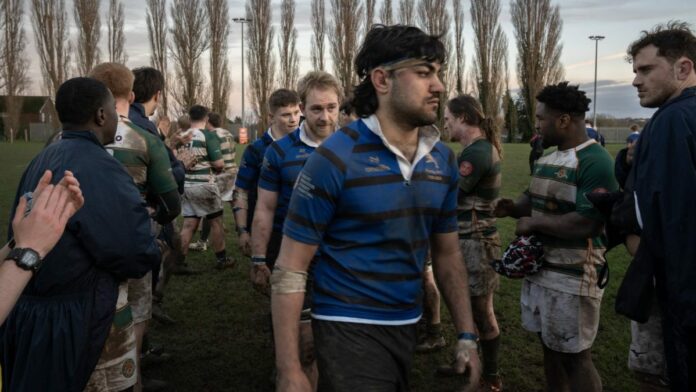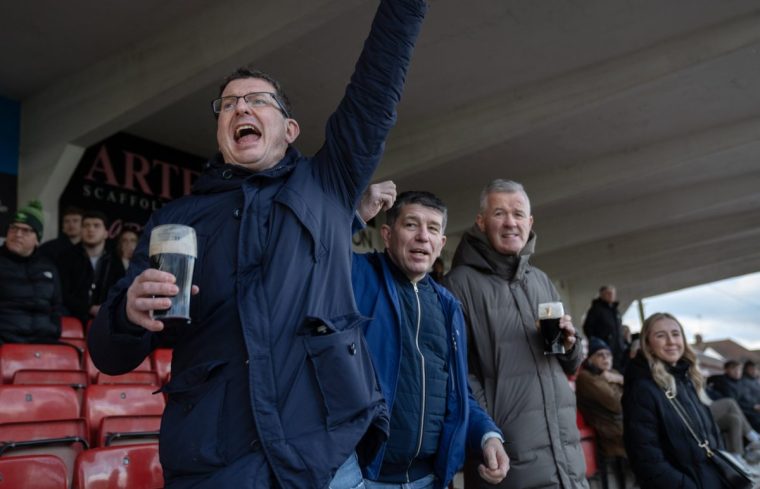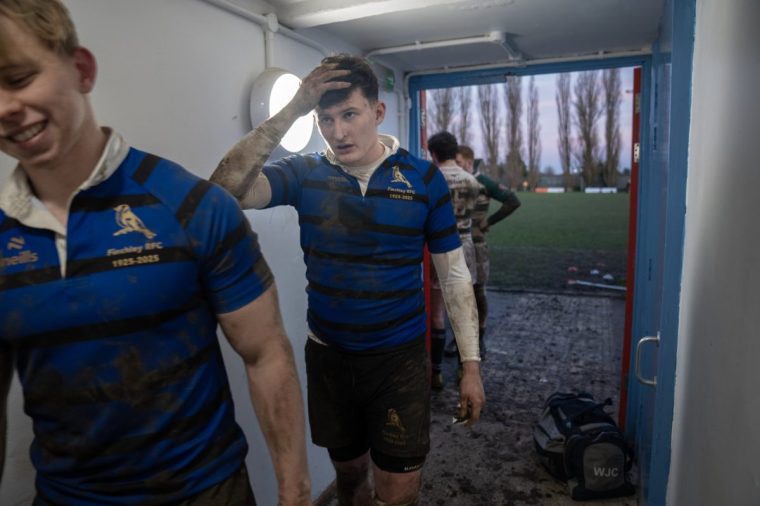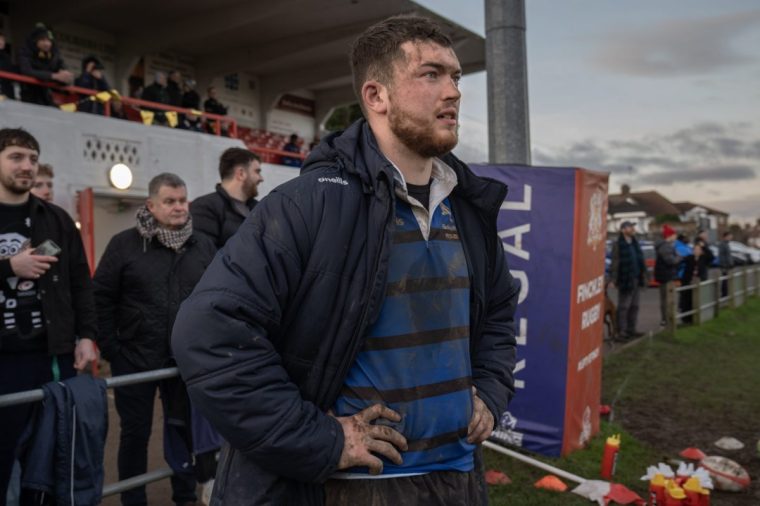
[ad_1]
RFU grants to keep grassroot clubs like Finchley RFC thriving are ‘no longer available’
The clubhouse at Finchley RFC is buzzing: men and women and children coming and going, laughing and joking, jostling at the bar, patting the heads of well-behaved dogs.
There is chat about the foundations for a container to house a pile of donated gym equipment, plates of curry doled out to the players of the first and second teams trooping in from their matches under cold but clear skies, and, blimey, have you heard about Lily, the 17-year-old joining up with next week’s England Under-18s? “Well done, Lily, we couldn’t be prouder!”
So is this the time and the place to introduce the subject of Rugby Football Union executive pay? The publicity has been fierce since English rugby’s governing body published its annual report three weeks ago.
An emergency meeting of the RFU Council will debate on Wednesday the scale and the methodology of awards such as the chief executive Bill Sweeney receiving an incentive payment of £358,000 on top of his £742,000 salary, for a wage of £1.1m.
Talk is rife of votes of no confidence. The RFU’s operating loss was almost £40m in an always challenging World Cup year. They insist the underlying figures are robust, and “participation numbers are now stable, post-Covid”.
And yes, here on this Saturday in this smart but small clubhouse, they want to have the debate – and with common sense in abundance.
Finchley RFC’s chairman, George Loureda, is chief engineer for the London Borough of Camden, he understands the world and the sport that is his passionate hobby.
His reaction is not of the knee-jerk variety, and therefore all the more salutary for the well-paid types at Twickenham.
“It’s just so detached from reality, from our perspective, it’s almost laughable,” says Loureda.
“It’s nonsensical; it has no connection. A million quid is a lifetime’s achievement of our whole rugby club and a whole community of volunteers pulling together. £300,000 as a bonus? There’s clearly a contractual arrangement, and somebody approved it. I don’t think grassroots would have approved it.”
Finchley RFC play a Saturday afternoon match against Ealing Trailfinders (Photo: Tom Pilston)
The bulk of the RFU executives’ incentive payment was linked to financial performance; in addition they met an unstated target for “participation in community rugby for men” while failing in “participation in community rugby for women and girls” and “rugby inclusivity”.
Each of the latter three areas was worth only a maximum 10 per cent of the payment, anyway – but they are the specialties of Finchley and hundreds of clubs like them.
“By all means pay people and attract top talent,” Loureda says, “but there’s got to be merit behind it.”
Formed in 1925, Finchley are in their centenary season. In the boom years, they ran seven men’s teams here in suburban north London. Now it’s the men’s firsts and seconds and a women’s team and the occasional vets.
![Youth players watch from the stand as Finchley RFC play a Saturday afternoon match against Ealing Trailfinders. A close match in which the hosts Finchley lost 24-26. [ Verbal consent was given but was a bit confusing as to who's father gave it. ]14/12/24. Photo Tom Pilston](https://rugby-247.com/wp-content/uploads/2024/12/1734592620_873_The-amateur-rugby-clubs-drowning-while-RFU-chief-trousers-11m.jpg) Youth players watch from the stand as Finchley RFC play (Photo: Tom Pilston)
Youth players watch from the stand as Finchley RFC play (Photo: Tom Pilston) Supporters cheer a Finchley try (Photo: Tom Pilston)
Supporters cheer a Finchley try (Photo: Tom Pilston)
Still, the commitment is wide-ranging. On the main pitch, as Finchley lose narrowly to Ealing’s amateurs in an entertaining level-seven fixture, the 43-year-old Bryden Fraser is a tighthead prop for fun and an electrician by trade: his company van is parked behind the posts and he coaches boys here too.
Then there is Lily Pereira Dos Santos. When her Brazilian father passed away, her South African mother sought help to channel her daughter’s energies and emotions. Lily found Finchley and Finchley gained a talent. They needed to sew the holes in her boots first, but that was no impediment.
Finchley’s girls’ section began four years ago, when Chris Grilli brought along his two daughters, and his pal Nick Jordan brought one, and they added three friends to make an initial group of six.
Now there are 80 girls in four age groups, and some of them have parents who are million-pound earners, while others have very little, jumping on two buses and a Tube to get to training from Tottenham.
Once they arrive, they are all equal, and spirited. The under-16s reached a national cup final at Worcester last season, and the girls bought flowers for their opponents. In a recent Middlesex Under-18s squad, half of the 34 players were from Finchley.
And that’s great, and everyone says women and girls is where English rugby will grow. But let’s not blithely sail past another salient point: Finchley are not giving up on anyone.
Almost half their under-11s are completely new to the sport. Loureda says: “We have a public school nearby in Mill Hill who do a great job, and maybe the RFU just wants them to produce players, because they don’t have to pay.
“But we work with other schools, and the support base for national rugby is at grassroots clubs. They’re the people who will get the international tickets and watch it on TV. This is where kids fall in love with the game.”
As if on cue, a father comes to the table where we’re chatting – can he bring his son tomorrow morning? Loureda swaps mobile numbers and the next day the 13-year-old lad is there and his first few weeks will be free. (Ultimately, annual subs of £200 will apply.)
 The disapointment of a close defeat on the face of players at Finchley RFC (Photo: Tom Pilston)
The disapointment of a close defeat on the face of players at Finchley RFC (Photo: Tom Pilston)
On the same morning, an Iranian refugee aged six plays his first game of tag; housed in a hotel, he revels in Finchley’s outdoor space. A decision not to charge refugees started when they threw their doors open to Ukrainians.
It’s not as if Finchley have no connections with the higher-ups. Debs Griffin, the next RFU President, played here. A former MP who is a member has arranged for the Commons & Lords team to play against Finchley at Twickenham in March.
The cost is £15,000. No problem, says Loureda – they will charge each player £300. No one round here needs telling how to make ends meet – not when the club’s entire annual turnover is around £100,000. A new deal with mouthguard provider Opro is netting a 10 per cent commission; that’s maybe £300 of revenue.
The RFU does provide cash, with grants totalling £15,000 possible for facility improvements and social spaces, linked to next year’s Women’s Rugby World Cup in England.
But this raises another question. “There used to be bigger grants,” says Loureda. “We had £40,000 for drainage, £40,000 for the main floodlights, £30,000 in matched funding for the changing rooms. Those sums are no longer available.”
And with 40 redundancies under way among Twickenham’s 500-strong workforce, Loureda bemoans a past cull of the RFU’s rugby development officers and community coaches.
“I’ve never seen anyone from the RFU, apart from one or two people from grants to make sure we’d done the work. We need a regional liaison officer to say, ‘George, how’s it going, where do you want us to support you’?”
Almost everyone at Finchley is a volunteer. The first-team coach is paid by the session, the bar staff are on the minimum wage, and expenses go to a physio who works for the NHS.
 Rested or injured players watch the dying moments (Photo: Tom Pilston)
Rested or injured players watch the dying moments (Photo: Tom Pilston)
The club’s website lists 24 sponsors, but most of their payment is in kind. A floodlight pylon blew down in the recent storms, and Fraser will have a look at that. The attractive bar is the work of a member who is a graphic designer, another donated the mirror.
The grade-two-listed grandstand’s red seats were inherited from Arsenal. A separate shower block for the girls would be great, the second-team pitch could do with better lighting, and maybe an artificial surface next to it, and so on.
In 2023-24, the RFU invested £65.6m per annum into professional rugby, and less than half that (£30.5m) to the community game. The lesson here is surely to feed London’s fertile grassroots with a flood of resources.
One of Finchley’s volunteer coaches chips in: “The interesting question is: what is the RFU for? If it is just going to keep this balloon in the air of the national team, but everything hollows out underneath, where does it go?
“The English rugby pyramid can only reach as high as the base is wide. And if you don’t have a sustainable base, it just evaporates. Someone needs to point out that we’re drowning, not waving, and we’re not the only ones.”
[ad_2]
Copyright for syndicated content belongs to the linked Source link

